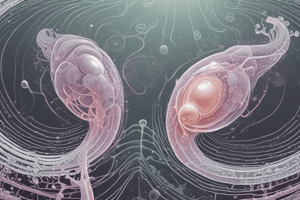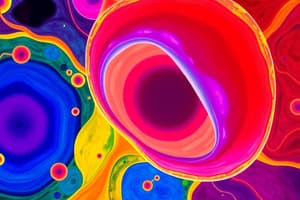Podcast
Questions and Answers
What is the process by which immature cells in the testes develop into mature spermatozoa?
What is the process by which immature cells in the testes develop into mature spermatozoa?
- Mitosis
- Meiosis
- Spermatogenesis (correct)
- Oogenesis
What is the stage where immature cells undergo mitosis to produce more spermatogonia or differentiate into primary spermatocytes?
What is the stage where immature cells undergo mitosis to produce more spermatogonia or differentiate into primary spermatocytes?
- Spermatogonia (correct)
- Secondary Spermatocytes
- Primary Spermatocytes
- Spermiogenesis
What is the process that reduces the number of chromosomes by half?
What is the process that reduces the number of chromosomes by half?
- Meiosis (correct)
- Apoptosis
- Mitosis
- Genetic Recombination
What increases genetic diversity during meiosis I?
What increases genetic diversity during meiosis I?
What eliminates defective or aberrant cells during spermatogenesis?
What eliminates defective or aberrant cells during spermatogenesis?
Which hormone regulates the process of spermatogenesis?
Which hormone regulates the process of spermatogenesis?
What provides structural and nutritional support to developing spermatozoa?
What provides structural and nutritional support to developing spermatozoa?
What can disruptions in spermatogenesis lead to?
What can disruptions in spermatogenesis lead to?
Flashcards are hidden until you start studying
Study Notes
Overview of Spermatogenesis
- Spermatogenesis is the process by which immature cells in the testes, called spermatogonia, develop into mature spermatozoa.
- It is a complex process involving multiple stages, including mitosis, meiosis, and differentiation.
Stages of Spermatogenesis
- Spermatogonia: Immature cells that undergo mitosis to produce more spermatogonia or differentiate into primary spermatocytes.
- Primary Spermatocytes: Undergo meiosis I to produce two secondary spermatocytes.
- Secondary Spermatocytes: Undergo meiosis II to produce four haploid spermatids.
- Spermiogenesis: Spermatids undergo differentiation, including the formation of the acrosome, flagellum, and condensation of DNA.
- Mature Spermatozoa: The final stage, characterized by a head, neck, and tail.
Key Events in Spermatogenesis
- Meiosis: Two successive cell divisions that reduce the number of chromosomes by half.
- Genetic Recombination: Crossing over of chromosomes during meiosis I increases genetic diversity.
- Apoptosis: Elimination of defective or aberrant cells ensures only healthy spermatozoa are produced.
Regulation of Spermatogenesis
- Hormonal Regulation: Follicle-stimulating hormone (FSH) and testosterone regulate the process.
- Sertoli Cells: Provide structural and nutritional support to developing spermatozoa.
- Cytokines and Growth Factors: Regulate the process and ensure proper differentiation.
Clinical Relevance
- Male Infertility: Disruptions in spermatogenesis can lead to infertility.
- Cancer: Abnormalities in spermatogenesis can increase the risk of testicular cancer.
Spermatogenesis Overview
- Spermatogenesis is the process by which immature cells in the testes, called spermatogonia, develop into mature spermatozoa.
Stages of Spermatogenesis
- Spermatogonia undergo mitosis to produce more spermatogonia or differentiate into primary spermatocytes.
- Primary spermatocytes undergo meiosis I to produce two secondary spermatocytes.
- Secondary spermatocytes undergo meiosis II to produce four haploid spermatids.
- Spermiogenesis: Spermatids undergo differentiation, including the formation of the acrosome, flagellum, and condensation of DNA.
- Mature spermatozoa: The final stage, characterized by a head, neck, and tail.
Key Events in Spermatogenesis
- Meiosis: Two successive cell divisions that reduce the number of chromosomes by half.
- Genetic recombination: Crossing over of chromosomes during meiosis I increases genetic diversity.
- Apoptosis: Elimination of defective or aberrant cells ensures only healthy spermatozoa are produced.
Regulation of Spermatogenesis
- Hormonal regulation: Follicle-stimulating hormone (FSH) and testosterone regulate the process.
- Sertoli cells: Provide structural and nutritional support to developing spermatozoa.
- Cytokines and growth factors: Regulate the process and ensure proper differentiation.
Clinical Relevance
- Male infertility: Disruptions in spermatogenesis can lead to infertility.
- Cancer: Abnormalities in spermatogenesis can increase the risk of testicular cancer.
Studying That Suits You
Use AI to generate personalized quizzes and flashcards to suit your learning preferences.




